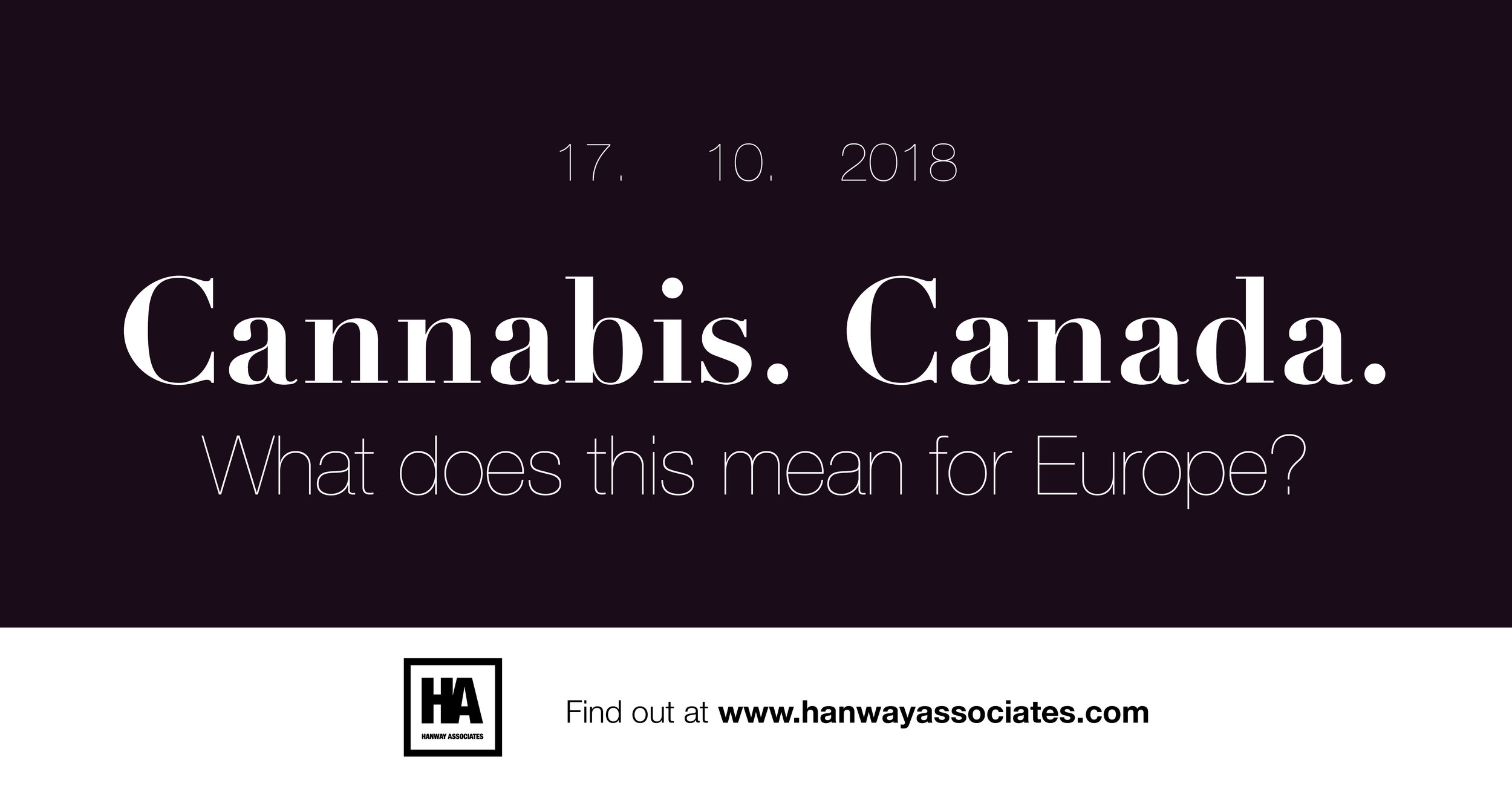Cannabis. Canada. What Does This Mean for Europe?
In a historic event that will be closely watched across the world, Canada today becomes the first G7 country to legalise cannabis for recreational use.
Canada is the second country in the world to do so after Uruguay, providing legal access to its population of 37 million and generating a domestic recreational market estimated to be worth $6.5 billion CAD (£3.8 billion) by 2020.
Cautious and considered policy-making
The Great White North’s path to legalisation has been markedly different to that of its North American neighbours. While individual US states such as Colorado, Washington, Oregon and California may have all legalised recreational cannabis, it remains strictly illegal at a federal level.
In these US states, legalisation was achieved by public ballots and fought for largely in the name of civil liberties. In contrast, Canada’s decision was led by the Liberal Party Prime Minister, Justin Trudeau, on an explicit platform to tackle crime and reduce children’s access to the drug:
“Obviously the current approach – the current prohibition of marijuana – has not worked to protect our kids, to keep the money out of the pockets of organised crime and that’s why we’re bringing in a new legalised framework around marijuana.”
- Canadian Prime Minister, Justin Trudeau
Canada’s approach to cannabis legalisation is a deliberate, cautious and considered one placing public health at its core; and as such, will be studied keenly by European governments disdainful of US states’ more gung-ho approaches to legalisation.
The Canadian federal government has established a licensing system for commercial cannabis cultivation accompanied by strict quality and testing requirements and a national cannabis tracking system.
Recreational cannabis will be sold both in-store and online, in opaque, child-proof plain packaging with mandatory health warnings and limited branding opportunities for budding businesses.
Canada’s provinces and territories hold control over their own distribution and retail sales models as well as minimum age, home-grow and cannabis use restrictions - diffusing political risk for the federal government while forming a series of natural experiments in the development of the industry.
While cannabis flower, along with cannabis oils, capsules and tinctures will be legal in Canada from today, further products such as vape pens, concentrates and edibles such as infused brownies and candies will remain prohibited while the federal government develops a framework for their regulation.
This reflects lessons learned by Colorado, which scrambled after legalisation to introduce controls over the dosing and packaging of edibles following cases of overconsumption and hospital admissions. While Canada’s decision means that such products will remain unregulated and untested (yet available) in the country’s sizeable black market until as late as October 2019, it underscores the country’s cautious approach to regulation and consumer health.
Canadian cannabis’ influence in Europe
European policymakers will be watching Canada closely for the effects of legislation, particularly in Switzerland and the Netherlands where recreational pilot programs are planned.
At the same time, Canadian companies are now looking to Europe as the next frontier of cannabis expansion, where the medical cannabis market is estimated to be worth over €55bn in the next decade.
More than 20 European countries have some form of medical cannabis programme, yet often lack the resources, expertise or infrastructure to cultivate cannabis and develop medication domestically. Canadian firms have already been instrumental in bridging this gap, providing imports, strategic partnerships and cultivation expertise to countries across the continent.
Already, Canadian LPs are the largest, most mature and well-funded enterprises in the global cannabis industry. As legalisation progresses and Canada’s LPs grow in experience - and in the eyes of the world, legitimacy - their European and wider international presence will continue to grow.
While still somewhat disconnected and diverse, the European medical cannabis markets are developing at remarkable speed.
Hanway Associates assists clients in understanding the regulatory and business environment across these unfolding markets.
Our conference series Cannabis Europa connects leaders of the medical cannabis industry with European policy-makers, patients and researchers to support the growth of a responsible and accessible European medical cannabis industry.
Canada’s legalisation brings a number of opportunities for wider European industries too: The specialty insurance firm Lloyd’s of London has announced that it will allow member firms to underwrite cannabis-related business in Canada, and as global sales of alcohol flatline, the UK drinks giant Diageo is rumoured to be in talks with Canadian LPs to develop a range of cannabis-infused beverages, mirroring entries by Molson Coors and Constellation Brands into the sector.
Canadian companies are also increasingly turning to finance centres in London and Europe for sources of institutional and retail investment, as events like Cannabis Invest UK this month attest.
Domino Effect?
Canada’s recreational legalisation comes as the UK undergoes its own cannabis reforms. Following a summer of consultation, patients from 1 November will have access to cannabis-based medicines on prescription.
The UK Home Office and Department for Health have repeatedly stated that medical access is not a precursor to recreational legalisation, and certainly such a move will not be politically viable in the short-term.
However, Canada’s international influence and leadership mean that its decision to legalise will not go unstudied by national governments and international bodies.
Even Canada’s contravention of current UN drug treaties may not prove diplomatically awkward for long: In November, the UN will undertake an in-depth review into the international drug classification of cannabis - the first to ever take place. If a review recommending rescheduling is accepted by the UN, international reclassification could occur as early as March 2019 - which could also trigger a review of US federal cannabis laws.
With movements to liberalise cannabis policy increasingly taking place on every continent (besides Antarctica, which technically already has no laws prohibiting cannabis), Canada’s measured, public health approach to cannabis regulation may well yet shape the framework of recreational regimes around the world. The UK in particular should look to learn from our commonwealth partner, and the rich data on the social, health and economic impact of legalisation that it will offer.
Whatever bumps lie ahead over the coming months, Canada’s legalisation of cannabis today should be celebrated as a triumph of considered policy-making, the birth of an exciting new industry, and the mark of an idea that's time has finally come.




